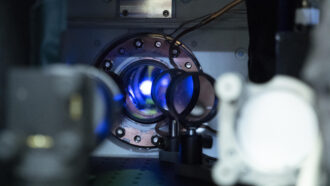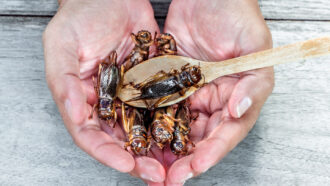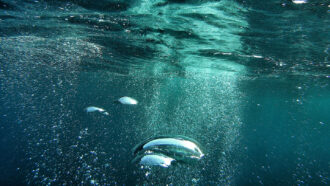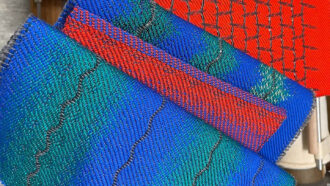HS-ETS1-2
Design a solution to a complex real-world problem by breaking it down into smaller, more manageable problems that can be solved through engineering.
-
 Health & Medicine
Health & MedicineJoggers run at an energy-efficient pace, new data show
Fitness trackers and treadmill tests show that a runner’s speed tends to vary little, regardless of the distance they run.
By Chris Gorski -
 Tech
TechA new audio system confuses smart devices that try to eavesdrop
It works by playing soft, calculated sounds to help people protect their privacy from automatic speech-recognition systems.
-
 Tech
TechTeens’ new tech would send alerts to reduce preventable deaths
A trio of teen innovations created devices that can speed up the response time to pool accidents, overheating in cars and combat-related injuries.
By Anna Gibbs -
 Climate
ClimateCoastal cities around the world are sinking, satellite data show
Of 99 coastal cities studied, nearly one-third are sinking. This leaves coastal communities increasingly vulnerable to rising seas.
-
 Physics
PhysicsA new clock shows how gravity warps time — even over tiny distances
This clock measured how gravity changes the passage of time in different places — even spots just one millimeter apart.
-
 Animals
AnimalsHere’s why cricket farmers may want to go green — literally
Crickets are great sources of protein, but they often kill each other in captivity. Green light could help solve the problem, two teens find.
By Anna Gibbs -
 Chemistry
ChemistryReusable plastic bottles release hundreds of pollutants into water
Data show the plastic ends up tainting drinking water. For now, scientists don’t know what health risks downing these pollutants might pose.
-
 Environment
EnvironmentBubbles could help remove trash from rivers
One young engineer devised a way to make bubbles sweep away the trash floating down a creek, like the one in her backyard.
By Anna Gibbs -
 Plants
PlantsElectric shocks act like vaccines to protect plants from viruses
To protect crops against viruses in their home country of Taiwan, two teens invented a novel approach to fight blights.
By Anna Gibbs -
 Tech
TechSmartphones can now bring Ice Age animals back to ‘life’
Scientists bring Ice Age creatures to life with augmented reality. You can view these creatures in your own world on a smartphone.
By Laura Allen -
 Chemistry
ChemistryCellulose may keep ice cream from turning gritty in your freezer
Adding nanocrystals extracted from wood avoids the growth of ice crystals, keeping your treat smooth and creamy.
By Anna Gibbs -
 Materials Science
Materials ScienceThis new fabric can ‘hear’ sounds or broadcast them
With special fibers that convert tiny vibrations to voltages, a new fabric senses sound. Someday, such fabrics could monitor the body or aid hearing.